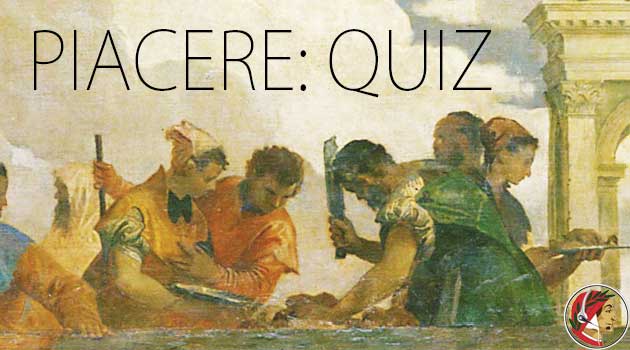What is the subject in a sentence like “Mi piace Firenze”? How about “Mi interessa Firenze”? Read this post and solve the quiz at the bottom
Ciao a tutti.
“Piacere”, translates in “to like” but has a different logic in Italian. If I say “Mi piace il gelato”, it means “I like ice cream” but translates literally in “Ice cream is pleasing to me”, where ice cream is the subject and “I” (me) is an indirect object. This works with other important Italian verbs.
If the thing I like is plural, the conjugation of the verb changes accordingly. For example, “Mi piacciono i miei amici”, I like my friends, actually is “My friends are pleasing to me”.
Indirect pronouns – Pronomi indiretti.
Depending on “who likes what”, we need to choose an appropriate pronoun. We already know that “to me” in Italian is “mi”. Let’s see the complete list So “you like ice cream” will be “ti piace il gelato”, “he likes ice cream” “gli piace il gelato” and so on. You will find more examples in the quiz.
We can use “piacere” to say that “I like doing” something. Instead of the gerund, in Italian we use the infinito. For example:
- I like playing soccer –> Mi piace giocare a calcio.
Many students are surprised when I teach them that piacere and similar verbs can of course be conjugated in any mood and tense, such as the congiuntivo, condizionale, gerundio … and so on. For intermediate – advanced students, try to understand the following:
- Pensavamo che vi piacessero i film francesi.
- Non credo che gli interessino i tuoi gusti musicali.
- Mi sono serviti i tuoi consigli.
- Mancandovi i soldi necessari, non comprerete quella casa.
- Le tue raccomandazioni non le basterebbero per ottenere quel lavoro.
Let’s see some simple examples with familiar tenses.
Mi piacerebbe…
We can use the condizionale, “mi piacerebbe”, (I would like to… lit. “It would be pleasing to me”) or “mi piacerebbero” in case of a plural noun. For example:
- Mi piacerebbe una macchina rossa.
- Mi piacerebbero dei pantaloni nuovi.
- Mi piacerebbe andare in vacanza.
I’d like to go on holiday. Ti piacerebbe andare in Italia?
Passato prossimo.
The verb piacere and all the other verbs with the same construction (see below) have essere as auxiliary verb with the passato prossimo. This has a visible consequence on the past participle, which is masculine or feminine, singular or plural according to the subject. Some examples.
- Mi è piaciuto il film.
- Ti è piaciuta questa serata?
- Gli sono piaciuti i tuoi amici
- Vi sono piaciute le patate?
If the subject is an action, we will just use piaciuto (singular masculine) in the passato prossimo.
- “Ci è piaciuto nuotare in piscina”, we liked swimming in the pool.
Similar verbs
The following are the most common verbs with the same grammar rules.
- sembrare – to seem – Carlo mi sembra intelligente.
- succedere – to happen to sb – Mi succede spesso di perdere il treno.
- bastare – to be enough – Ti bastano 100 euro?
- mancare – to miss – Gli mancano due esami per laurearsi.
- servire – to need – Vi serve un aiuto?
- interessare – to be of interest – Non ci interessano i musei.
- convenire – to be advisable/worthwhile – Mi conviene andare, è tardi.
Grazie e a presto. Completa il quiz e vinci una lezione su Skype o Zoom
Quiz-summary
0 of 8 questions completed
Questions:
- 1
- 2
- 3
- 4
- 5
- 6
- 7
- 8
Information
LOADING QUIZ...
You have already completed the quiz before. Hence you can not start it again.
Quiz is loading...
You must sign in or sign up to start the quiz.
You have to finish following quiz, to start this quiz:
Results
Time has elapsed
Your score is 0 out of 0 points, (0)
| Average score |
|
| Your score |
|
Categories
- Not categorized 0%
- 1
- 2
- 3
- 4
- 5
- 6
- 7
- 8
- Answered
- Review
-
Question 1 of 8
1. Question
I like Italian Opera and theatre

Correct
Mi piacciono l'opera italiana e il teatro.
✅ Check your answers↓↓↓
Incorrect
Mi piacciono l'opera italiana e il teatro.
✅ Check your answers↓↓↓
-
Question 2 of 8
2. Question
Does Laura like porchetta?
No, she doesn't like it
Correct
No, non le piace.
✅ Check your answers↓↓↓
Incorrect
No, non le piace.
✅ Check your answers↓↓↓
-
Question 3 of 8
3. Question
Girls, would you like to eat a pizza tonight?
Correct
Ragazze, vi piacerebbe mangiare una pizza stasera?
✅ Check your answers↓↓↓
Incorrect
Ragazze, vi piacerebbe mangiare una pizza stasera?
✅ Check your answers↓↓↓
-
Question 4 of 8
4. Question
Did he like the Vatican Museums?
 Correct
Correct
Gli sono piaciuti i musei vaticani?
✅ Check your answers↓↓↓
Incorrect
Gli sono piaciuti i musei vaticani?
✅ Check your answers↓↓↓
-
Question 5 of 8
5. Question
She missed her son
 Correct
Correct
✅ Check your answers↓↓↓
Incorrect
✅ Check your answers↓↓↓
-
Question 6 of 8
6. Question
We are interested in Italian art.
 Correct
Correct
✅ Check your answers↓↓↓
Incorrect
✅ Check your answers↓↓↓
-
Question 7 of 8
7. Question
When he was young, he liked smoking
 Correct
Correct
✅ Check your answers↓↓↓
Incorrect
✅ Check your answers↓↓↓
-
Question 8 of 8
8. Question
He needs some help with his car
 Correct
Correct
✅ Check your FINAL SCORE!↓↓↓
Incorrect
✅ Check your FINAL SCORE!↓↓↓

